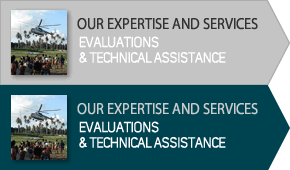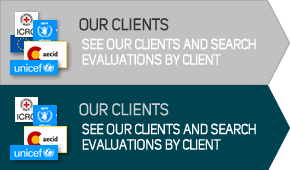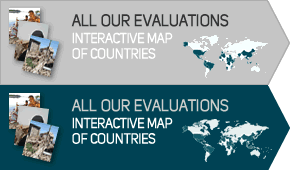The scale and breadth of DARA’s field research and evaluation work gives the organisation an unparalleled overview of what works well and what does not in aid – based on direct experience and evidence from the field:
WFP Evaluation in Democratic Republic of Congo EVAL
DARA carried out a strategic evaluation of the World Food Programme’s (WFP) activities in DRC, with a special focus on the interrelation between the different coordination mechanisms, and the roles of UN agencies and other key humanitarian actors. The outcomes [...] Read more...
Evaluation of the performance of SDC instruments in fragile states and conflict-affected contexts EVAL
This evaluation was commissioned as part of the process of considering how to work better in fragile and conflict-affected states. It was set against the backdrop of a new Federal Council Dispatch 2013-2016 (Botschaft), which was the main legal and financial instrument [...] Read more...
Inter-Agency Real Time Evaluation of the Humanitarian response to Pakistan’s Displacement Crisis in 2009 EVAL
This evaluation was listed by UNICEF as one of the best evaluations in recent years. The Inter-Agency Standing Committee (IASC) commissioned an inter-agency real-time evaluation to obtain real-time analysis and feedback to better focus and adjust on-going [...] Read more...
Assessment of the Aid provided by the Spanish Bilateral Cooperation within the Health Sector EVAL
The DCSyM (Sectorial and Multilateral Cooperation Directorate) of the Spanish Agency for International Development Cooperation (AECID in its Spanish acronym) has selected DARA to review the aid provided by the General Administration of the State (AGE) to the health [...] Read more...
Evaluation of the DG ECHO’s Action in the Saharawi Refugee Camps (2006-2008) EVAL
DG ECHO has been assisting the Saharawi refugees since 1993. ECHO funds most of UN agencies and international organisations that work in the camps. In 2007 and 2008, assistance was provided through two different funding decisions (one on humanitarian aid, and [...] Read more...
Evaluation of the relevance and effects of the International Committee of the Red Cross (ICRC) operational position on Internally Displaced Persons (IDP) EVAL
The purpose of this evaluation is to provide the general management of ICRC with an independent assessment of the relevance, coherence, and effects of the operational position of ICRC on internally displaced persons, considering the reform of the humanitarian [...] Read more...
Joint Follow-up Evaluation of the TEC-LRRD Evaluation (LRRD 2) EVAL
The TEC evaluation had five parts and four parts concentrated largely on process issues – coordination, need assessment, capacity-building and funding – while the LRRD part looked at outcome issues as well: what were the consequences of successful and unsuccessful [...] Read more...
Technical Assistance to IBIS: Elaboration of West African Strategy EVAL
IBIS works in five regions, with the most recent being West Africa. The regional presence covers a country programme in Ghana and humanitarian/rehabilitation project implementation in Liberia and Sierra Leone. The West Africa programme is expected to grow considerably [...] Read more...
HAP Audit of Danish Church Aid, 2008 EVAL
Audited Danish Church Aid Headquarters against the HAP standards. HAP standards have been introduced to make humanitarian action accountable to intended beneficiaries through self-regulation. An agency certified against the HAP Standard means that it has been [...] Read more...
Raising the Bar: Enhancing transatlantic governance on disaster relief and preparedness EVAL
The Raising the Bar Project is designed to enhance transatlantic coherence and cooperation in humanitarian action. Over 18 months, a project team based on a unique network of transatlantic organizations conducted field-based empirical research to provide an in [...] Read more...




Share this